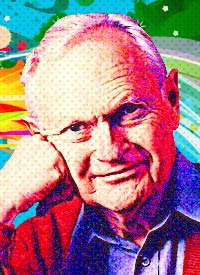
Image by Sean McCabe in AARP
Papers across the world this morning are announcing the death of 83-year-old surgeon Sherwin B. Nuland, perhaps most well-known for his National Book Award-winning “How We Die: Reflections on Life’s Final Chapter.”
On a personal note, Sherwin Nuland was known affectionately as Shep by my family. He and my father were young roommates – physicians-in-training in London in the late 1950s.
Last spring, my father and I had the chance to see Shep in New Haven, CT, where he was still very active at the Yale School of Medicine. He was everything that all of the obituaries say about him today – thoughtful, intellectual, capable, dignified, humble, a mensch. Time passed quickly, and a few days later, we exchanged messages by email.
Having learned of my “Year to Live” project, he wrote that, in thinking about mortality, “I seem always to get back to the same thing, which is that the prime elements in happiness are to have found one’s work and to have loved.”
Noting that my email signature is a quote by Grace Paley, “The only recognizable feature of hope is action,” he offered me words that spoke to him by Leon Wieseltier, an editor of The New Republic:
“Epiphanies, our secular mysticism, are barren freaks of experience unless they are made to serve as beginnings, and raptures are succeeded by chores.”
Shep lived by that sentiment, whether it was in caring for his patients, demythologizing the process of dying, being honest about his struggles with severe depression, or simply letting those he met feel that they were his traveling companions on an epic journey to uncover the true meaning of Hope.
I leave you today with a passage on that very hope from “How We Die”…
“When my time comes, I will seek hope in the knowledge that insofar as possible I will not be allowed to suffer or be subjected to needless attempts to maintain life;
I will seek it in the certainty that I will not be abandoned to die alone;
I am seeking it now, in the way I try to live my life, so that those who value what I am will have profited by my time on earth and be left with comforting recollections of what we have meant to one another.”
All of my family’s very best wishes to Shep’s loved ones, and as the Jewish blessing he cherished goes, “May his memory be for a blessing.”





How does one deal with a loss whether material, or otherwise? Could it be by realizing that at the moment of conception the process has begun. The result of this process is death, and should not be ignored. But what if one focuses on the process itself? Ask questions such as what does it mean to live. who and what does one deem as valuable..Memento Mori and Moment Humani.